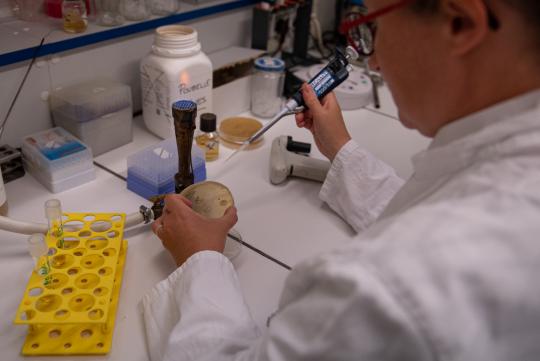Food, Global Health Reading time 3 min
A 100% French nasal vaccine against COVID-19 yields positive pre-clinical results
Published on 17 September 2021
*ANR RA-COVID-19 funding and Centre Val de Loire Region funding for joint initiatives in the fight against COVID 19.
In contrast to intramuscular vaccines, only nasal vaccines are able to block the virus in the nose by inducing local immunity in the nasal mucosa, i.e. the portal of entry and multiplication of the virus. The vaccine candidate, developed by the BioMAP team[1], would take position as the eighth nasal vaccine currently starting clinical testing in the world, and the only one based on viral proteins in France.
This technology for nasal vaccine has already proven to be an efficient barrier against toxoplasmosis infection in primates
This SARS-CoV-2 protein vaccine candidate builds on the BioMAP team's expertise in mucosal vaccine design. In partnership with the biotech company Vaxinano, the team has already successfully developed an effective candidate vaccine to protect monkeys from toxoplasmosis. This stable, non-toxic and adjuvant-free nasal vaccine is based on a total protein extract from Toxoplasma gondii, the infectious agent being produced by the team and further encapsulated in starch and lipid-based nanoparticles (Vaxinano technology). The SARS-CoV-2 nasal vaccine candidate is based on similar technology.
In a similar strategy, the SARS-CoV-2 vaccine protein component was designed and produced by the team, and then encapsulated by Vaxinano. The vaccine, consisting of the Spike protein with other viral proteins that are not prone to mutations, would protect vaccinated individuals regardless of the mutated circulating coronavirus variant strains.
This vaccine was first tested in vivo in a pre-clinical mouse model. Two nasal applications, three weeks apart, induced a strong humoral immune response – in particular of the mucosal compartment with neutralising Immunoglobulin A (IgAs[2]), which are polyspecific, i.e. more permissive against variation of the Sars-CoV-2 – along with a cellular response in the nasal cavities and lungs. The protective efficacy of the vaccine was also assessed in terms of survival and absence of clinical signs after infection on vaccinated animals, 100% of individuals survived with no clinical signs (respiratory distress, weight loss, etc.) unlike the unvaccinated control group. Second, the candidate vaccine was tested for contagiousness in the established Syrian hamster model, which mimics the human pathophysiology of COVID-19, again providing striking results with no viral detection in the lungs and nose of vaccinated/infected animals while unvaccinated/infected animals showed a high level of viral RNA in both lungs and nasal cavities. These results, highly predictive of the effectiveness of a vaccine in humans, allow us to predict that contagiousness between individuals is completely abolished.

An easily administered, non-invasive vaccine as a first dose or a booster
Technically, the vaccine will be administered by means of a small adapter placed at the end of a needle-less syringe, allowing an ideal diffusion within the nasal cavity. Currently, a device developed for this vaccine specifically for humans is being evaluated in collaboration with the Recipharm/Resyca group. Non-invasive and requiring minimal logistics, this basic vaccination system would allow for a wider distribution to Europe and far beyond. Moreover, the vaccine is highly stable at room temperature and even longer at 4°C and thus would not require the strict logistics mandatory to maintain cold chain integrity, unavailable in most countries of the world.
This vaccine would therefore target unvaccinated populations to protect against severe and moderate forms of COVID-19 and could moreover be a booster for already vaccinated populations to prevent transmission of the virus.
A 100% French research and development consortium
Based on these results, the research team will rely on the skills of companies based in France, which have already been identified, to develop its vaccine for future clinical trials:
-Vaxinano, based in Lille,
-GTP Bioways, a CDM[3], (Contract Development and Manufacturing Organisation) based near Toulouse,
-C.RIS Pharma, a CRO[4], based in Saint Malo,
-Recipharm, a manufacturer based in Monts, near Tours.
The transition to the clinical phase, supported by the ANRS/ Maladies infectieuses émergentes[5], is scheduled for the second half of 2022, with the perspective to bringing the vaccine to market in 2023.
Made possible by the financial support of the ANR and the Centre-Val de Loire Regional Council, as well as by the commitment of all the partners mentioned, this project still involves a number of stages to be completed before the vaccine is brought to market. It is set to provide a major improvement in the protection of populations, in terms of prevention, contagiousness, effectiveness on current and future variants, and increasing the percentage of people vaccinated and thus collective protection.
Interview with Isabelle Dimier-Poisson (for English subtitles, click on parameters at the bottom of the video)
|
Laboratories involved in the pre-clinical studies
|
|---|
[1] The BioMap team of the Infectiology and Public Health joint research unit is directed by Professor Isabelle Dimier-Poisson, at the university’s department of medicine.
[2] Immunoglobulin A (IgA) is an antibody isotype that plays a crucial role in immune function of the mucous membranes. They are a first line of immune defence against toxins and infectious agents in the environment.
[3] CDMOs are pharmaceutical subcontractors whose core business is the manufacturing and packaging of medicines on an industrial scale.
[4] CROs are companies specialising in clinical trial organisation services for the pharmaceutical industry and for Public Scientific and Technical Research Establishments in France (EPST). CROs are involved in all phases of research and development particularly in the pharmacovigilance phase.
[5] Created on 1 January 2021, the ANRS/ Maladies infectieuses émergentes is the new autonomous agency of INSERM, created by the merger of the REACTing consortium and the National Agency for AIDS Research (ANRS) under the joint impetus of its two supervisory ministries, the Ministry of Higher Education, Research and Innovation and the Ministry for Solidarity and Health.
